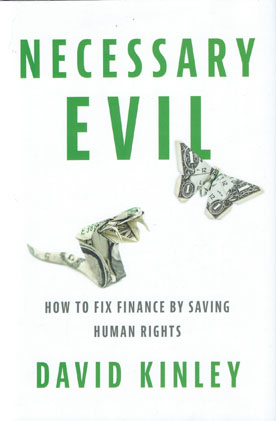
Finance governs almost every aspect of modern life. Every day, we use the financial system to mortgage our homes, to insure our health, to invest in our futures through education and pension funds, to feed and clothe ourselves, to be paid for our labor, and to help others in need.
As the fuel of capitalism, finance has been a major force for human progress for centuries. Yet it has periodically generated disasters too, from the Great Depression to the recent sub-prime mortgage crisis.
In writing Necessary Evil, eminent human rights law scholar David Kinley spent ten years immersed in researching finance's many facetsafrom how it is raised and what it is spent on, to when it is gambled and who wins and who loses to produce this unique account of how finance works from a human rights perspective. He argues that while finance has historically facilitated many beneficial trends in human well-being, a sea change has occurred in the past quarter century.
Since the end of the Cold War, the finance sector's power has grown by leaps and bounds, to the point where it is now out of control. Oversight of the sector has been weakened by deregulation, as powerful lobbyists have persuaded our leaders that what is good for finance is good for the economy as a whole. Kinley shows how finance has become societyas master rather than its servant, and how, as a consequence, human rights concerns are so often ignored, sidelined or crushed.
Using episodes of financial malfeasance from around the globeL from the world's banking capitals to the mines of central Africa and the factories of East Asia. Kinley illustrates how the tools of international finance time and time again fail to advance the human condition. Kinley also suggests policies that can help finance protect and promote human rights and thereby regain the public trust and credibility it has so spectacularly lost over the past decade.
An authoritative account of the extraordinary social consequences of the financial system at the heart of the worldas economy, Necessary Evil will be an essential tool for anyone committed to making global capitalism a fairer and more effective vehicle for improving the lives of many, and not just providing for the comfort of a few.